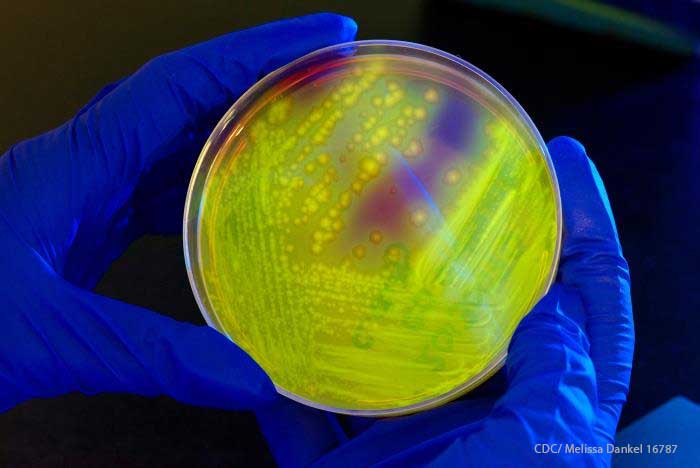Scientists at Oregon State University have been trying to figure out how to kill antibiotic resistant bacteria.
Bacteria found in our food supplies that have caused food poisoning outbreaks have been increasingly resistant to several types of antibiotics. In all large food poisoning outbreaks covered by the CDC, scientists test the bacteria for antibiotic resistance. They have found resistance to antibiotics on several levels in some outbreaks.
For instance, in the 2015 multistate outbreak of Salmonella I4,[5],12:8:- and Salmonella Infantis infections linked to pork produced by Kapowsin Meats in Washington state, all 10 isolates were multidrug resistant. And in the Salmonella Poona outbreak linked to imported cucumbers that peaked in August and September 2015, 2 of the 30 isolates were drug resistant. This resistance is associated with increased risk of hospitalization, treatment failure, and development of a bloodstream infection.
The CDC also states that in 2011, about 3 of every 100 human E. coli O157 isolates were resistant to at least 5 classes of antibiotics. And many Shigella infections in children are resistant to at least one of the antibiotics that are approved for treatment in that age group.
Researchers have found that these resistant bacteria carry a gene called NDM-1. That gene products an enzyme called New Delhi metallo-beta-lactamase that destroys antibiotics. Moreover, bacteria can pass the NDM-1 gene on to other pathogens.
These bacteria are becoming resistant to “last ditch” antibiotics. Most of those drugs are no longer used because they can have devastating side effects. Because the most advanced penicillin-type of antibiotics are no longer effective against some bacteria, doctors have had to use colistin, an antibiotic that can be toxic to the kidneys.
The researchers at OSU constructed a molecule called peptide-conjugated phosphorodiamidate morpholino oligomer (PPMO) that can destroy the enzyme produced by NDM-1. Dr. Bruce Geller, professor of microbiology at OSU’s College of Science and College of Agricultural Sciences, said, “We’re targeting a resistance mechanism that’s shared by a whole bunch of pathogens. It’s the same gene in different types of bacteria, so you only have to have one PPMO that’s effective for all of them, which is different than other PPMOs that are genus specific.”
In in-vitro studies, the PPMO molecule restored the ability of meropenem, an ultra-broad-spectrum drug of the carbapenem class, to fight three different bacteria that expressed NDM-1. This molecule should be ready for human tests in about three years, according to the OSU researchers.
“We’ve lost the ability to use many of our mainstream antibiotics,” Geller said. “Everything’s resistant to them now. That’s left us to try to develop new drugs to stay one step ahead of the bacteria, but the more we look the more we don’t find anything new. So that’s left us with making modifications to existing antibiotics, but as soon as you make a chemical change, the bugs mutate and now they’re resistant to the new, chemically modified antibiotic.”
Resource: Sully, Erin K., et al. “Peptide-conjugated phosphorodiamidate morpholino oligomer (PPMO) restores carbapenem susceptibility to NDM-1-positive pathogens in vitro and in vivo.” Journal of Antimicrobial Chemotherapy(2016): dkw476.
Food Safety Law Firm
Pritzker Hageman law firm is one of the few in the United States that practices extensively in the area of food poisoning litigation. Our lawyers have won numerous cases against national companies for people sickened by contaminated food, including cases where the foodborne pathogen was antibiotic resistant.
“Food processors are responsible for making sure their products are not adulterated with deadly pathogens,” said attorney Fred Pritzker, who recently won $4.5 million for a client sickened by meat tainted with E. coli bacteria. “When our clients sue companies that have failed to provide safe food, they are sending a message that food safety should always come before profits.”
Additional Information

